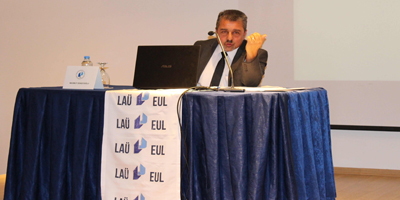“The Role of Auditing in the Executive Activities” analyzed at EUL

European University of Lefke (EUL) Faculty of Economics and Administrative Sciences Department of Public Administration organized a conference themed “The Role of Auditing in the Executive Activities”. Chairman of the Presidency Supervisory Council of the T.R.N.C Mahmut Denizcioğlu attended the conference as a speaker.
Denizcioğlu: Audit is a systematic, planned and programmed process
Denizcioğlu described audit as a systematic, planned and programmed process applied with the aim of analyzing and measuring the results of economic activities and events, according to the criteria and standards objectively; preventing errors that might happen in the future; guiding the financial control systems to become valid, secure and consistent and announcing the obtained results to the authorities.
Denizcioğlu stated that the concept of audit reflects inspection, examination and control and described the phenomenon of inspection as examining whether the works, transactions and accounts carried out in a certain period are carried out in accordance with the objectives and rules determined by the legislation, and determination of the appropriateness of the amount of documents and notes and the amount of movable and immovable property. He further described the examination as determining the accuracy and correctness of a subject or operations and transactions based on the available information or documents; and accordingly, the activities carried out to determine the procedures to be performed within the framework of the legislation. Denizcioğlu finally described the concept of control as hierarchical control activities carried out by managers; in other words, a management control built within its own structure to help managers run the institution and achieve its objectives on a perpetual basis.
Denizcioğlu: Audit can be divided into three
Denizcioğlu stated that audit can be divided into three as internal audit, external audit and supreme audit and described internal audit as a unit within the body of the related organization that performs the function of examining and evaluating the activities of the organization. He also said that external audits by external persons and institutions that are not related to the relevant organization are external audits and added that supreme audit is a form of auditing carried out on behalf of the parliament, in planning, in practice and in a completely independent manner for the delivery of its results to the Assembly.
Denizcioğlu: Accountability has three dimensions
Denizcioğlu listed the process of auditing as planning of the audit, reporting the results of the audit, sending the reports to the parliament and / or public administrations, monitoring (actions carried out in accordance with audit recommendations) and emphasized the necessity of accountability and transparency in the an accurate audit system. Denizcioğlu also said that accountability has three dimensions and listed these as responsibility for political accountability, managerial accountability and accountability for citizens. He further stated that a transparent system provides the citizens with the necessary information about how and for what purposes the governors use the resources of the public.
The conference ended after Denizcioğlu answered questions from students.
